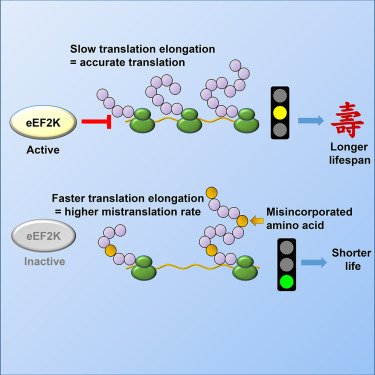Current Biology ( IF 8.1 ) Pub Date : 2019-02-14 , DOI: 10.1016/j.cub.2019.01.029 Jianling Xie , Viviane de Souza Alves , Tobias von der Haar , Louise O’Keefe , Roman V. Lenchine , Kirk B. Jensen , Rui Liu , Mark J. Coldwell , Xuemin Wang , Christopher G. Proud

|
Maintaining accuracy during protein synthesis is crucial to avoid producing misfolded and/or non-functional proteins. The target of rapamycin complex 1 (TORC1) pathway and the activity of the protein synthesis machinery are known to negatively regulate lifespan in many organisms, although the precise mechanisms involved remain unclear. Mammalian TORC1 signaling accelerates the elongation stage of protein synthesis by inactivating eukaryotic elongation factor 2 kinase (eEF2K), which, when active, phosphorylates and inhibits eEF2, which mediates the movement of ribosomes along mRNAs, thereby slowing down the rate of elongation. We show that eEF2K enhances the accuracy of protein synthesis under a range of conditions and in several cell types. For example, our data reveal it links mammalian (m)TORC1 signaling to the accuracy of translation. Activation of eEF2K decreases misreading or termination readthrough errors during elongation, whereas knocking down or knocking out eEF2K increases their frequency. eEF2K also promotes the correct recognition of start codons in mRNAs. Reduced translational fidelity is known to correlate with shorter lifespan. Consistent with this, deletion of the eEF2K ortholog or other factors implicated in translation fidelity in Caenorhabditis elegans decreases lifespan, and eEF2K is required for lifespan extension induced by nutrient restriction. Our data uncover a novel mechanism linking nutrient supply, mTORC1 signaling, and the elongation stage of protein synthesis, which enhances the accuracy of protein synthesis. Our data also indicate that modulating translation elongation and its fidelity affects lifespan.
中文翻译:

蛋白质合成延伸阶段的调控可提高翻译精度并调节寿命
在蛋白质合成过程中保持准确性对于避免产生错误折叠和/或无功能的蛋白质至关重要。雷帕霉素复合物1(TORC1)途径的靶标和蛋白质合成机制的活性已知会负面调节许多生物的寿命,尽管所涉及的确切机制尚不清楚。哺乳动物TORC1信号传导通过灭活真核生物延伸因子2激酶(eEF2K)来加速蛋白质合成的延伸阶段,该激酶在激活时会磷酸化并抑制eEF2,后者介导核糖体沿mRNA的移动,从而减慢了延伸速度。我们表明,eEF2K在一定范围的条件下和几种细胞类型中增强了蛋白质合成的准确性。例如,我们的数据显示,它将哺乳动物(m)TORC1信号与翻译的准确性联系起来。eEF2K的激活减少了延伸过程中的误读或终止通读错误,而敲除或敲除eEF2K则增加了它们的频率。eEF2K还可以促进对mRNA中起始密码子的正确识别。降低的翻译保真度已知与较短的寿命相关。与此相符的是,eEF2K直向同源物或其他与翻译保真度有关的因素的缺失秀丽隐杆线虫会降低寿命,而eEF2K是营养限制导致的寿命延长所必需的。我们的数据揭示了一种新颖的机制,可将营养物供应,mTORC1信号传导和蛋白质合成的延长阶段联系起来,从而提高了蛋白质合成的准确性。我们的数据还表明,调节翻译延伸及其保真度会影响寿命。













































 京公网安备 11010802027423号
京公网安备 11010802027423号